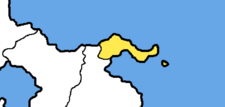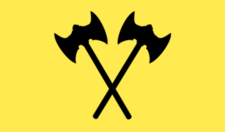Duchy of Jijo: Difference between revisions
No edit summary |
No edit summary |
||
| Line 74: | Line 74: | ||
|footnote_a = | |footnote_a = | ||
}} | }} | ||
'''Jijo''', or officially known as the '''Duchy of Jijo''' is a political subdivision within the [[Southern Ivili Clan]] and the greater Kingdom of [[Flatstone]]. | '''Jijo''', or officially known as the '''Duchy of Jijo''' is a political subdivision within the [[Ivili Clan|Southern Ivili Clan]] and the greater Kingdom of [[Flatstone]]. | ||
The duchy, originally dawning the superficial title of clan, was established during the pre-medieval period of Flatstone. A time when the peoples of the archipelago lacked a sense of national unity or identity. The clan would be established in what is known today as the province Jijo, going on to conquer the Bebanu and the area in which the city of Umudin resides today, establishing the city towards the end of the tenth century. Due to the Umudins considerable growth in size and population relatively quickly, likely because of its strategic positioning on Flatstones north eastern coast, lead to the city being appointed the capital of the Duchy of Jijo in the twelfth century, when the Duchy of Jijo conquered the southward region Abomase, reaching its greatest territorial extent at the end of the twelfth century. | The duchy, originally dawning the superficial title of clan, was established during the pre-medieval period of Flatstone. A time when the peoples of the archipelago lacked a sense of national unity or identity. The clan would be established in what is known today as the province Jijo, going on to conquer the Bebanu and the area in which the city of Umudin resides today, establishing the city towards the end of the tenth century. Due to the Umudins considerable growth in size and population relatively quickly, likely because of its strategic positioning on Flatstones north eastern coast, lead to the city being appointed the capital of the Duchy of Jijo in the twelfth century, when the Duchy of Jijo conquered the southward region Abomase, reaching its greatest territorial extent at the end of the twelfth century. | ||
Revision as of 23:21, 20 January 2023
This article is incomplete because it is pending further input from participants, or it is a work-in-progress by one author. Please comment on this article's talk page to share your input, comments and questions. Note: To contribute to this article, you may need to seek help from the author(s) of this page. |
Jijo Kosīposu The Duchy of Jijo | |
|---|---|
|
Flag | |
| Motto: "Pāşon īş kopenī." (National) "Happiness is key." (English) | |
| Anthem: "Kopemon" (Happy Song) | |
 Map of the Duchy of Jijo's geographical location | |
| Capital | Desoka |
| Largest city | Umudīn |
| Official languages | |
| Religion | Kopen, Geology |
| Demonym(s) | Jijo |
| Government | Absolute Monarchy |
• Head Shaman | Dekomen Solabo |
| Founded | |
• The Stonish Civil War | Summer of 970 October 9th 2011 |
| Area | |
• Total | 3,235 km2 (1,249 sq mi) |
| Population | |
• 2021 estimate | 63,200 |
• 2018 census | 61,211 |
• Density | 19/km2 (49.2/sq mi) |
| Currency | Sand Dollar (SNDL) |
| Time zone | UTC+3 (UTC) |
• Summer (DST) | UTC+3 (not observed) |
| Driving side | right |
| Internet TLD | .rock |
Jijo, or officially known as the Duchy of Jijo is a political subdivision within the Southern Ivili Clan and the greater Kingdom of Flatstone.
The duchy, originally dawning the superficial title of clan, was established during the pre-medieval period of Flatstone. A time when the peoples of the archipelago lacked a sense of national unity or identity. The clan would be established in what is known today as the province Jijo, going on to conquer the Bebanu and the area in which the city of Umudin resides today, establishing the city towards the end of the tenth century. Due to the Umudins considerable growth in size and population relatively quickly, likely because of its strategic positioning on Flatstones north eastern coast, lead to the city being appointed the capital of the Duchy of Jijo in the twelfth century, when the Duchy of Jijo conquered the southward region Abomase, reaching its greatest territorial extent at the end of the twelfth century.
The clan would then be incorporated into the expanding Southern Ivili clan diplomatically, adopting the status of vassal under the Southern Ivili nobles that had exerted their influence in the region without bloodshed. This is when the Jijo clan would recieve the title of duchy, under Southern Ivili rule. During Southern Ivili occupation, the clan would enjoy two and a half decades of peace and prosperity, allowing the duchy valuable time to centralize and consolidate itself, significantly developing the landscape and it's ability to navigate trade into and out of the region. In 1232, Northern Ivili troops would defeat the Southern Ivili and Taverkny armies at Umudin, rendering them unable to resist occupation. At the conclusion of the First Stonish War of Unification, the entirety of the Southern Ivili clan, as well as the lesser Duchy of Jijo, would be incorporated into the newly created Kingdom of Flatstone, maintaining it's land and status as duchy. However, despite now having to pay tribute to the Northern Ivili rather than the Southern Ivili, the Duchy of Jijo still had to answer to the Southern Ivili clan.
History
Incorporation into the Kingdom
The Jijo Clan was incorporated into the First Kingdom of Flatstone in 1232, after a decade long occupation by the Northern Ivili. Following the collapse of Ejek Vedotins theocratic government in 1155, the Stonish archipelago had once again found itself fractured into four rival nations, competing against each other for power. The dominant powers maintained hegemony over the vassals that they possessed during the time of Ejek Vedotin, meaning that the Duchy of Jijo remained an integral part of the Southern Ivili clan even after the collapse of theocracy. Until the turn of the thirteenth century, the Duchy enjoyed numerous political freedoms, acting as an essentially independent state, prioritizing its own needs over that of the greater Southern Ivili clan; many other Southern Ivili vassals did the same. It wouldn't be until 1210, when efforts to centralize the nations of the archipelago due to rising tensions in the north were collectively made by rulers abroad. However, even after Jijo liberties were repressed by the Southern Ivili, the region still enjoyed a significant amount of prosperity due to its economic importance to the south, Umudin serving as the trade and cultural capital of the Southern Ivili clan. Large amounts of money were invested into the development of the region, leading to the creation of multiple shipbuilding facilities and shipyards that remain in service in modern day.
Period of Democratic Rule
Following the conclusion of the White Revolution in the 1960's, a democratic party was hoisted onto the government of Flatstone. The administrative divisions of the country were rearranged accordingly, and all monocratic institutions in Flatstone, including the Duchy of Jijo, were abolished and replaced by a census-guided administration, and a new system of provinces and counties. The Duchy of Jijo was divided into three predominant provinces: Umudin, Jijo, and Bebanu. After the fall of the democratic Stonish government in the 2010's, these province names would be inherited by the Duchy of Jijo when it was re-established in 2011.
Modern Day
Today, the Duchy of Jijo remains a strong part of Stonish history, culture, and economic interest. Umudin serves as the third largest city within the nation, following behind Suntuga and the capital of Vedoti. The Duchy of Jijo makes up for up to one fifth of the Stonish economy, maintaining its leadership in a variety of maritime industries such as that of shipbuilding, fishing, and agriculture. Umudin is the largest blue water port in Flatstone, boasting a population of just over 600,000 people. The city is one of the oldest in Flatstone, situated on the northernmost tip of the Umudin peninsula. The city is a popular tourist attraction, being the site of many important historical locations and sites, as well as the birthplace of a variety of significant historical figures.
Administration
Jurisdiction
The jurisdiction of the duchy within the kingdom of Flatstone and the lesser Southern Ivili clan is rather limited, serving as little more than an administrative division of the more autonomous Southern Ivili clan, which is relatively centralized. The Duchy of Jijo maintains some of it's political freedoms, possessing the right to maintain its own independent police force and regional government, but also being required to contribute the entirety of its industry and military capabilities to the Stonish crown, government, and state. During the first Kingdom of Flatstone, the Duchy of Jijo was permitted to possess its own army, acting as a specialized national guard of the time, dawning its own uniforms and unique methods of training. This was of course abolished in the 60's following the expulsion of the Stonish crown after the White Revolution's conclusion.
Provinces
The Duchy of Jijo possesses three of its own subdivisions, officially designated as provinces within the Stonish government.
List
| State | State code | Since | Capital | Legislature | Head of state and government (Head Shaman) |
Area (km2) |
Pop. (2020) |
Pop. per km2 | HDI (2018) |
GDP per capita (2020) |
|---|---|---|---|---|---|---|---|---|---|---|
| Bebanu | BB | 2011 | Desoka | Kopenist Shamanry | Dekomen Solabo | 847 | 13,000+ | 15 | 0.625 | 45,108 |
| Jijo | JI | 2011 | Zakol | Kopenist Shamanry | Dekomen Solabo | 1157 | 18,500+ | 16 | 0.697 | 46,498 |
| Umudin | UD | 2011 | Umudin | Kopenist Shamanry | Dekomen Solabo | 420 | 23,000+ | 55 | 0.734 | 65,421 |
